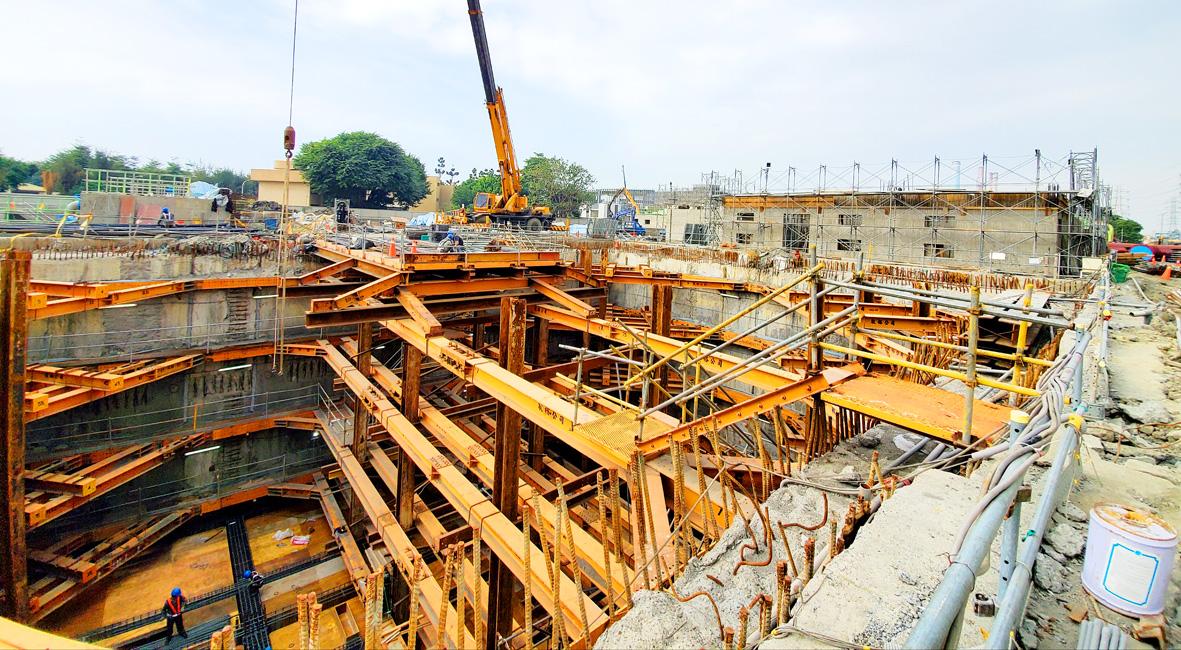The official manufacturing purchasing managers’ index (PMI) last month fell to 63.2, slowing from an unprecedented high a month earlier, as the Lunar New Year holiday cut the number of working days, while firms displayed the strongest business sentiment on record, the Chunghua Institution for Economic Research (CIER, 中華經濟研究院) said yesterday.
All manufacturing sectors except textile and food suppliers reported business upswings last month from a year earlier, although the Lunar New Year holiday eliminated one week, which explains why the economic barometer stayed in the expansion zone, but shed 1.9 points, the Taipei-based think tank said.
PMI data aim to capture the health of the manufacturing industry, with scores lower than 50 indicating contraction and values above the neutral threshold signaling expansion.

Photo: Chen Wen-chan, Taipei Times
“Holiday disruptions accounted for the month-on-month retreat, which is harmless, as firms expressed clear order visibility for the coming six months,” CIER president Chang Chuang-chang (張傳章) told a media briefing.
Expectations of a global economic recovery have led businesses around the world to rebuild inventory, ramping up production at their local suppliers, Chang said, adding that the trend would become more evident as more people receive COVID-19 vaccines.
The reading on the six-month business outlook added 3.2 points to a record 73.3, as orders swelled across all sectors, Chang said.
For last month, the sub-index on new work stood at 65.6, comfortably in the positive territory, and so was the industrial output measure, at 63.9, the CIER survey showed.
Hiring activity hovered at a similar level of 58, or 0.5 points lower from one month earlier.
The sub-index for delivery time held steady at 73.3, as container shortages and shipping delays deteriorated, it said.
Customers’ inventory level was 44.5, 1.3 points lower from one month earlier.
The measure on raw material prices surged to 87.8, the highest since the launch of the survey in July 2012, as recovery expectations pushed up demand, Chang said, adding that a global container shortage and earlier snow storms in the US made things worse.
Strong order visibility drove some firms to rearrange shipment schedules by first meeting demand from customers who offered higher prices or placed larger orders, CIER researcher Chen Shin-hui (陳馨蕙) said.
Firms are more eager to replenish inventory and less concerned about material costs, compared with the previous quarter, Chen said.
Purchasing activity among non-manufacturing firms last month showed a similar pattern of losing some steam with a reading of 52.1, 2.9 points lower than in January, CIER said.
Unfavorable holiday effects were poignant for shipping and logistics service providers and insurance companies, the institute said.
Service-focused firms are generally upbeat about business moving forward, except restaurants and hotels, it said.

France cannot afford to ignore the third credit-rating reduction in less than a year, French Minister of Finance Roland Lescure said. “Three agencies have downgraded us and we can’t ignore this cloud,” he told Franceinfo on Saturday, speaking just hours after S&P lowered his country’s credit rating to “A+” from “AA-” in an unscheduled move. “Fundamentally, it’s an additional cloud to a weather forecast that was already pretty gray. It’s a call for lucidity and responsibility,” he said, adding that this is “a call to be serious.” The credit assessor’s move means France has lost its double-A rating at two of the

AI BOOST: Although Taiwan’s reliance on Chinese rare earth elements is limited, it could face indirect impacts from supply issues and price volatility, an economist said DBS Bank Ltd (星展銀行) has sharply raised its forecast for Taiwan’s economic growth this year to 5.6 percent, citing stronger-than-expected exports and investment linked to artificial intelligence (AI), as it said that the current momentum could peak soon. The acceleration of the global AI race has fueled a surge in Taiwan’s AI-related capital spending and exports of information and communications technology (ICT) products, which have been key drivers of growth this year. “We have revised our GDP forecast for Taiwan upward to 5.6 percent from 4 percent, an upgrade that mainly reflects stronger-than-expected AI-related exports and investment in the third

Mercuries Life Insurance Co (三商美邦人壽) shares surged to a seven-month high this week after local media reported that E.Sun Financial Holding Co (玉山金控) had outbid CTBC Financial Holding Co (中信金控) in the financially strained insurer’s ongoing sale process. Shares of the mid-sized life insurer climbed 5.8 percent this week to NT$6.72, extending a nearly 18 percent rally over the past month, as investors bet on the likelihood of an impending takeover. The final round of bidding closed on Thursday, marking a critical step in the 32-year-old insurer’s search for a buyer after years of struggling to meet capital adequacy requirements. Local media reports

RARE EARTHS: The call between the US Treasury Secretary and his Chinese counterpart came as Washington sought to rally G7 partners in response to China’s export controls China and the US on Saturday agreed to conduct another round of trade negotiations in the coming week, as the world’s two biggest economies seek to avoid another damaging tit-for-tat tariff battle. Beijing last week announced sweeping controls on the critical rare earths industry, prompting US President Donald Trump to threaten 100 percent tariffs on imports from China in retaliation. Trump had also threatened to cancel his expected meeting with Chinese President Xi Jinping (習近平) in South Korea later this month on the sidelines of the APEC summit. In the latest indication of efforts to resolve their dispute, Chinese state media reported that